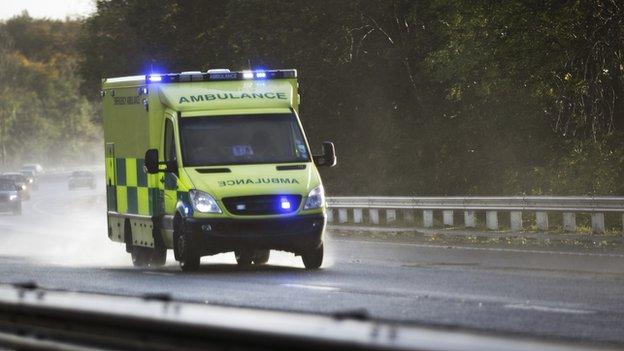NHS reorganisation was disastrous, says King's Fund
- Published
- comments

Radical changes to the way the NHS in England is organised have been "disastrous" and "distracted" from patient care, leading analysts say.
The evaluation by the King's Fund think tank says the coalition government's changes had wasted three years, failed patients, caused financial distress and left a strategic vacuum.
Labour has called for a personal apology from David Cameron.
But Labour itself is accused of "crying wolf" over privatisation.
The government said the report showed its plans for the future were right.
The behind-the-scenes changes may not have been immediately apparent to patients in GP surgeries.
Chris Ham, chief executive of the King's Fund: "If the government hadn't pursued misguided reforms... we believe the NHS would be in better shape"
But they were described by NHS leaders as "so big you could see them from space".
The changes, which came into force in 2013, abolished large numbers of NHS organisations.
Purse strings
The aim was to shift the balance of power in the NHS to give GPs more say over the way budgets were spent.
It provoked uproar in sections of the medical profession, in part over the role of potential privatisation of some services.
King's Fund chief executive Chris Ham told the BBC: "People in the NHS focused on rearranging the deckchairs rather than the core business of improving patient care.
"That's contributed to the increasing waiting times and declining performance that patients are experiencing."
He described the reforms as simply "disastrous" and said that only in the past two years had the government got its focus right.
However Andrew Lansley, who was the health secretary behind the changes, said patient care had been improved, and patients "will continue to see the results" of the reforms.
'Bewildering'
During the reorganisation, all 151 primary care trusts - which provided services such as hospitals, dentists and opticians - and the 10 regional strategic health authorities were abolished.
New bodies called clinical commissioning groups were set up locally.
The report says: "A set of policies designed to streamline and simplify the organisation of the NHS ended up having the opposite effect."
It adds that the system is "bewildering in its complexity" and has left a "strategic vacuum" in some areas.
The King's Fund says that in the past two years, the focus has rightly shifted to improving patient safety and quality of care as well as treating more people at home rather than in hospital.
In a warning ahead of the election campaign the report said: "If there is one clear message from the experience of the past five years, it is that politicians of all parties should be wary of ever again embarking on top-down restructuring of the NHS."
There was also criticism of Labour, who, the King's Fund says, is "crying wolf" with "ill-founded" claims about the NHS being privatised.

Labour leader Ed Miliband said: "So now we know that every time patients wait longer for their test results, longer in A&E, longer to get an operation, the responsibility goes direct to David Cameron's door.
"And today he should personally apologise to the British people for having betrayed their trust, let them down and damaged our National Health Service."
A spokesman for Health Secretary Jeremy Hunt said: "We welcome the King's Fund's recognition that the government's focus on patient safety and integrated care is right for the NHS's future.
"This independent assessment also puts paid to Ed Miliband's myth that the reforms were about privatisation, and highlights why both the public and the health sector should be wary of Labour's plans for upheaval and reorganisation."
Chaos
Dr Mark Porter, head of the British Medical Association (BMA) said the changes were "opposed by patients, the public and NHS staff, but politicians pushed through the changes regardless".
He added: "This report highlights the damage that has been done to the health service and the major shortcomings of the Act, which distracted attention from rising pressure on services and cost billions to introduce.
"The damage done to the NHS has been profound and intense, but what is needed now is an honest and frank debate over how we can put right what has gone wrong without the need for another unnecessary and costly top-down reorganisation."
But Mr Lansley said: "The report is silent on the question of whether patient care has been improved, on which the evidence is clear.
"The NHS is now judged to be the best health service in the world. The number of administrators has fallen, doctors and nurses have risen, productivity has gone up, and waste has been cut by over £5bn a year.
"Public sector reform has never been a popularity contest, but these reforms will last."
- Published5 February 2015
- Published5 February 2015

- Published5 February 2015
